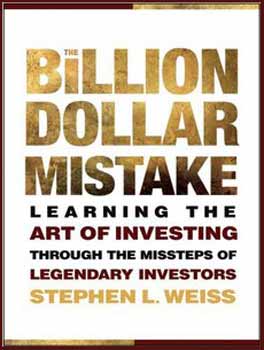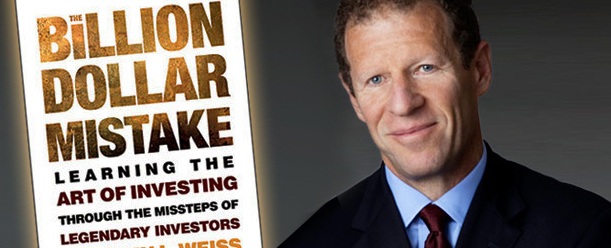If done correctly, investing is an iterative process. One that is experienced. Obviously, if one puts everything he owns into a high-flying cloud technology stock and blows himself out, that process is stunted. Part of being an investor is playing defensively enough to continue building on past wins.
I recently had the chance to sit down with Stephen Weiss, author of Billion Dollar Mistake: Learning the Art of Investing Through the Missteps of Legendary Investors and a very experienced executive on Wall Street. Here’s what he shared about learning from mistakes:
What do you learn more from looking at mistakes than maybe looking at successful trades?
Weiss: Well, what I found through my career and observing others is that the best investors I ever got to know, the one’s I covered through my career, and I think I have covered a hall of fame of investment professionals, was that they spent more time dissecting their mistakes so they wouldn’t repeat them, than dissecting the victories, the winning investments. They seem to resonate more, and they are much more aggravating. When you make money on stock, or on an investment theme, you pat yourself on the back and say, “OK, let’s move on.”
You do have your discipline, and you follow that discipline, but when you make a mistake it really resonates because it has cost you money. And whether it’s blow to your ego, or a blow to your wallet, generally it’s both, you want to make sure you don’t do it again. It’s, “How can I be so stupid? How did I do that?” If you can keep that mental list, or in some cases, like I do a written checklist, and say, “You know what? I’m not going to do that again, I found it’s made me money by not costing me money.”
I think that’s so interesting, so insightful. As I was reading through the book, and I was thinking about the approach, a lot of times, successful trades, it’s unclear whether they are based on skill or on luck, you know? But at least with a losing trade, you now have an opportunity to say, “Hey, what went wrong? How could I have been more skillful in that trade?”
Weiss: Yeah. Absolutely right, and mistakes, if you can take the mistakes out of your process, you do well. It’s no different than we just saw in the Super Bowl. So, guess what? The team that won made fewer mistakes. Steelers turned it over, interceptions, fumbles. Green Bay was mistake free, essentially, so they came out on top. I don’t think it’s any different in investing.









